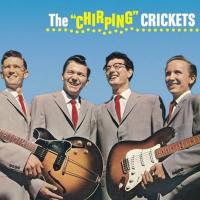The "Chirping Crickets" Is Rock'n'Roll's DNA
The song's history is long and complicated. Holly, his Lubbock friend Sonny Curtis and drummer Jerry Allison went to see John Wayne in "The Searchers" and heard Duke utter the phrase "That'll Be the Day". Holly, at the time signed to Decca, recorded the song at Owen Bradley's Barn Studio during the summer of 1956 but the label passed on releasing anything from the session and Holly's contract forbade him from re-recording and releasing any of the tunes from the session.
Producer Norman Petty re-recorded the song crediting it to "The Crickets" instead of to Buddy Holly and it was released on Brunswick, which of course, was a subsidiary of Decca. Holly was re-signed as a solo to Bob Thiele's Coral while Brunswick released his recordings with The Crickets—not that teenagers knew or cared about any of this!
However, once the song became a hit on Brunswick, Decca released the original version backed by "Rock Around With Ollie Vee"and put it on the album of the same name, but neither that single nor that album was the hit this version and album became.
Anyone who thought Brian Epstein was a genius for outfitting the Beatles in identical suits need only look at the cover of this album to see where that came from (Epstein was a genius for other reasons). Looking at the brightly lit cover might make you think of the foursome standing out in a Clovis, New Mexico field where Norman Petty had his recording studio, but it was actually shot on the rooftop of the Brooklyn Paramount Theater where the group played along with Chuck Berry and Fats Domino and others, either in September or December of 1957 depending upon who you ask. The bright sunlight looks more like September than December.
This album, originally released in America on November 27th 1957, is unusual in that rather than containing one or maybe two hits and a great deal of filler, it's all good with no filler. Not all of it was recorded in Clovis as the band was in demand and on tour. "You've Got Love", "An Empty Cup (And a Broken Date" (both co-written by Roy Orbison), "Rock Me My Baby" and "Maybe Baby" were recorded September of 1957 "after hours" in the Officer's Club at Tinker Air Force Base in Oklahoma City where Petty had set up his gear shlepped from Clovis, during a short tour break.
On "That'll Be the Day" Larry Wellborn plays bass and there's a backing trio featuring June Clark and Gary and Ramona Tollett. On "Oh Boy" as well as on the Tinker Air Force Base tracks a group called The Picks (Bill and John Pickering and Bob Latham) provide backing vocals.
That's worth mentioning because even if you've previously heard these tracks, you've not before heard them with the clarity, transparency and punch that you'll hear on this remarkable reissue—a dream come true (albeit a short one!) for Buddy Holly fans. Kevin Gray cut from the original master tape—something if you doubt reading this, you won't when you hear the record.
Yes it's sometimes bright and it's obviously basic mono, but it's also thrillingly transparent and detail filled. The top end is clean, "crisp" (in the best sense of the word) and downright incredible considering the tape's age. It must have been recorded to the pretty much indestructible Scotch 111, but I'm just guessing. You've never heard the classics: "Oh Boy", "Not Fade Away", "Maybe Baby", "That'll Be the Day" and "I'm Looking For Someone to Love" sound this fresh and vibrant.
Listening to the same tracks on the rightly revered 2 LP Steve Hoffman mastered Buddy Holly Legend (MCA 2-4184) makes it apparent that obviously Steve had to make copies to assemble cutting reels and that he's applied both EQ and some compression to produce versions that were more "ear-pleasing" than representative of what was on the tapes. The tracks on that compilation also on this release sound comparatively thick, congealed and lacking in transparency, high frequency air and transient "snap".
Six short songs per side still makes for an electrifying listen all these years later. Buddy Holly died in that February, 3rd 1959 plane crash at the age of 22 that also killed Ritchie Valens and J.P. "The Big Bopper" Richardson near Clear Lake Iowa. It was the day, as Don MacLean sang, the music died. This reissue almost brings the music back to life.




